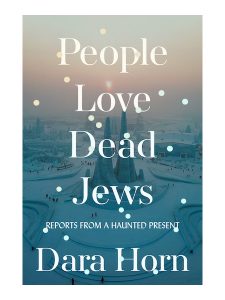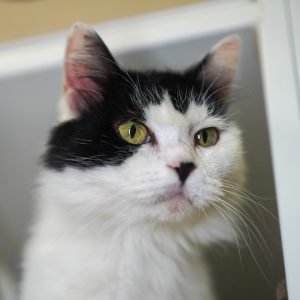Have you ever hidden a part of yourself? Maybe for a job interview or a date, you dressed up or put on your best self. Maybe in this increasingly polarized world, you held your tongue and kept your peace. I know I have, sometimes to the point of feeling like a chameleon to fit in.
Listening to Jewish student interview Dara Horn about her book People Love Dead Jews and about anti-Semitism, I realized something about the ways I present myself: I never expect to be fully comfortable expressing myself. Students on college campuses today seem not to even know what being comfortable would feel like. From both the right and the left, they have ready examples of incidents of Jew-hatred that they or a close friend have experienced.
 For nine months, I had asked them about their experiences and gotten a general response of "nothing in real life but social media has been awful." Talking with Dara Horn, they shared multiple real-life examples. Stories they would not tell me when I asked, in order to be helpful, they shared in the context of this book talk. Whereas in my life, I had found ways to make known the anti-Semitism I experienced even if, in gentle ways, these students seem to have waited until they could wait no longer; they did not mince words.
For nine months, I had asked them about their experiences and gotten a general response of "nothing in real life but social media has been awful." Talking with Dara Horn, they shared multiple real-life examples. Stories they would not tell me when I asked, in order to be helpful, they shared in the context of this book talk. Whereas in my life, I had found ways to make known the anti-Semitism I experienced even if, in gentle ways, these students seem to have waited until they could wait no longer; they did not mince words.
The book helps and, despite its title and purpose, gives me hope. Dara Horn uses the Jewish holidays of Purim and Hanukkah to describe two forms of anti-Semitism. Purim, based on the Book of Esther, tells a tale of a Jew-hater who seeks to destroy all the Jews. Hanukkah, before the Maccabean victory over the Syrian Greeks, tells the tale of a ruling power that pushes assimilation to its culture and slowly disallows Jewish practices. The models are compelling, and, indeed in both cases, the Jews survive attempts to kill their persons in one case and their identity in the other.
My hope comes not from these tales of survival against mighty foes; my hope comes from the way these stories contrast with the upcoming Jewish holiday of Passover. Passover begins with the same type of anti-Semitism practiced by the Syrian Greeks. The Jews joined Joseph in Egypt only to have a pharaoh arise who would then enslave them and take away their right to their practices. Then, we get Moses who, like Esther, grows into his Jewish identity to then save the Jews.
Finally, we get the contrast as the Jewish people set their own calendar, create their own rituals (which become the Passover seder), and go on to become a nation with a system of justice and with a sacred purpose. That last bit, that becoming a “priestly nation,” of becoming “a light unto the nations” is what gives me hope.
Judaism has not survived merely by awareness of anti-Semitism and somehow surviving it; Judaism has survived because it has a positive purpose. We exercise that purpose on Passover. We take time to “see ourselves as if we were slaves in Egypt and now are free.” We learn empathy, and then, we enact educational rituals that force us to ask what it means to be free. In essence, Passover ritualizes the reminder to live as Jews.
Yes, there is a real reason to be afraid. There is an historic and ongoing social pressure to live less as Jews or less Jewishly, to be “dead Jews.” Then, there is Passover which speaks very particularly to Jews and also has universal meaning that has inspired many to seek freedom, to fight for it.
I pray that this year’s Passover inspires us all to speak up for ourselves against the pharaohs of our lives, even if they be hard-hearted. And I pray that this year’s Passover delivers all of us out of our personal confines—our mitzrayim (straits, the literal meaning of the Hebrew for Egypt)—and into the wilderness of positive possibility and of being fully ourselves.
About Rabbi Jeremy Winaker
Rabbi Jeremy Winaker is the executive director of the Greater Philadelphia Hillel Network, responsible for West Chester University, Haverford, Bryn Mawr, and other area colleges. He is the former head of school at the Albert Einstein Academy in Wilmington and was the senior Jewish educator at the Kristol Hillel Center at the University of Delaware for four years. Rabbi Winaker lives in Delaware with his wife and three children.


Comments